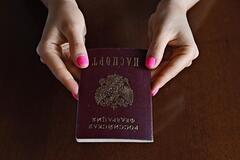State Duma Deputy Khinshtein proposed to deprive oppositionists of citizenship for hatred of the country

Photo: Igor Ivanko / Kommersant
State Duma Deputy Alexander Khinshtein proposed expanding the grounds for depriving Russian citizenship. He wrote about it in his Telegram channel.
According to the politician, citizenship should also be deprived of those people who “received it by birthright.”
Sometimes you listen to the revelations of our oppositionists and think: why do you need a Russian passport if you hate your country and your people?

Alexander Khinshtein, State Duma Deputy
New bill
Russian President Vladimir Putin has submitted to the State Duma a bill that provides for the introduction of the institution of termination of the country's citizenship.
The explanatory note specifies that the procedure will be introduced instead of the current procedure for canceling decisions on the issuance of a Russian passport.
According to the bill, it is also planned to create a unified mechanism for voluntary renunciation of citizenship. It is noted that the authority to consider the relevant decisions will be transferred to the Ministry of Internal Affairs. At the moment, the solution of these issues is in the jurisdiction of the Russian leader.
The head of the Federation Council committee on constitutional legislation and state construction, Andrei Klishas, said that the bill on citizenship could be considered during the spring session of parliament.
Simplification of obtaining citizenship
The draft basic law “On Citizenship of the Russian Federation” submitted to the State Duma by Putin proposes to give the head of state more powers to determine the categories of persons who are entitled to a simplified acquisition of Russian citizenship.
It is proposed to simplify the acquisition of citizenship for persons who already live on the territory of Russia, “are able to organically integrate into the system of positive social ties and become full-fledged members of Russian society.”
In addition, the right to a simplified acquisition of Russian citizenship will be granted to persons who have relatives living in the country who are citizens of the Russian Federation. It is also proposed to give such an opportunity to citizens of the former USSR and their children who are participants in the voluntary resettlement program, and the descendants of those who permanently lived within the current borders of Russia in the Russian Empire or the USSR.
Citizenship for children
Russian Foreign Minister Sergei Lavrov called for the automatic granting of citizenship to children from mixed marriages, wherever they are.
Wherever a child is born in a mixed marriage – on the territory of Russia or on the territory of a foreign state – he is obliged, in accordance with the constitution, to automatically obtain Russian citizenship

Sergey LavrovMinister of Foreign Affairs of Russia
Deputy Speaker of the State Duma Anna Kuznetsova supported Lavrov's proposal. According to her, the automatic acquisition of Russian citizenship would be useful for many families and would help them to more easily solve various life issues.
A member of the international committee of the Federation Council, Sergei Tsekov, in turn, said that the idea of granting Russian citizenship to children who were born in mixed marriages was correct. According to him, in this way the child immediately falls under the protection of the state.
The politician also noted that he supports any ideas that make it easier for compatriots to obtain Russian citizenship.
Accepted innovations
In July 2020, the federal law on the simplified acquisition of Russian citizenship for foreigners and stateless people came into force. According to the new rules, a person may not renounce his previous citizenship and at the same time apply for a new status, having lived in the country less than previously required.
For example, former Soviet citizens who do not have citizenship and live in the territory of the ex-Soviet republics do not have to stay in Russia for three years and confirm the existence of a legal source of income before receiving a Russian passport. These changes also apply to foreigners, one of whose parents lives in the country and has citizenship, or if the person has a family and children with a citizen or citizen of Russia.
Citizens of Ukraine, Belarus, Kazakhstan, Moldova need a valid residence permit when applying for a Russian passport.
In addition, according to the new rules, graduates of Russian universities can count on a new status not after three, but after one year of work in the country.

